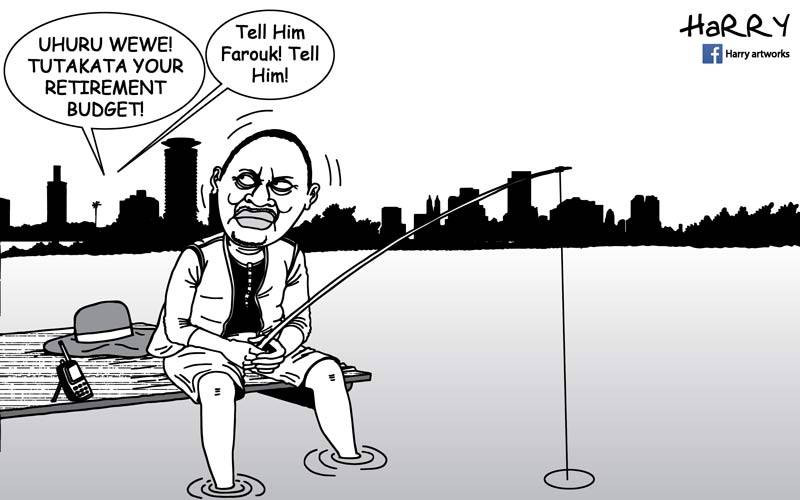
Nairobians have a phrase they use to express resignation over the state of national affairs. “Hapa ndiyo digital migration imetufikisha”. That is exactly how I felt when the President slandered newspapers and the noble profession of journalism for the second time in a widely televised news broadcast.
It was a cheap shot implying that Kenyan newspapers would find better use as wrapping paper for meat in butcheries. The context was a headline story critical of the Deputy President. Seasoned journalists remained calm. Veteran editors did not fret either.
Politics is a game of opportunism.
On the podium, anything that can rouse up a lacklustre crowd shall not be passed up. In the range of scapegoats within reach, journalists were an easy pick. An active Journalists Union would not have passed up the opportunity either. A retaliatory statement would have been issued in under 48 hours. A strongly worded statement read out by the chairman, demanding a retraction.
Good journalism




However, when a media stakeholder with associate interests in print media voices the sardonic, just shake your head and get back to work. Good journalism attracts detractors. What good are you in this business if you cannot make a few enemies?
It must be noted that the public was not quick to defend the Press. Local press corps have accumulated their fair share of Kenyan stereotypes and in this age of social media the critics swelled.
The public’s faith in mainstream media is shifty at best. The reading audience is extremely picky. They settle for a panel of consistent media voices and single source their news. Everyone else is described as dicey until they pass the test of consistency and time. Besides, mainstream press monopoly on opinion is over. The majority of citizen reporters on social media consider themselves smarter than journalists.
We are accustomed to sampling the posts of social media experts who can explain the context of a national story in 140 characters and still find room to lord their opinion. Therefore, the President’s dismissal of newspapers is good for the profession. When a president gets cozy with journos, credibility issues arise. Much like an opposition figure getting invited for ugali and nyama choma at State House.
Floyd Mayweather and Manny Pacquiao hugging before the hyped bout. Tom and Jerry making up. The Government and the 4th estate should maintain a healthy distrust for each other. It is a lot better for business that way. On the ground though, the landscape has changed. Content diversity on the Internet caters to virtually any need. Consumers can exercise the power of choice and they have democratised news sourcing.
This is not the big media of old that held absolute sway on public opinion. Fashion bloggers are creating headline news. Twitter news hounds are scooping established media houses. Amateur videos are breaking news by the minute. Teenage YouTube sensations doing their hair, register views that newspaper circulation chiefs would kill for. It is a different terrain. If does not break on Facebook or Twitter, it never happened.
Incredible challenges
In this explosive digital reality, the competition eats you up for lunch. People live life on the go. In age of digital media, the print cycle is analogue. Slow. Any newspaper that is not migrating is missing the boat. By the time the stories are pooled, sieved, dressed and presented as fresh news, the cycle has moved on. People argued and exhausted all angles. A hash tag has a very short life span.
Consequently, the face of print has to change and newspapers are going virtual to survive. Print is no longer the first option for news. I meet folks on the street who demand to know why I stopped writing. My reply is typically, “Actually, I write a column in Crazy Monday magazine”. To which the response is, “I rarely read a physical paper these days.”
Stay informed. Subscribe to our newsletter
I blame the socialites. A village-based intellectual who references Sam Kahiga and Terry Hirst (from the golden age of Kenyan journalism) predicted that once socialites made it into the dailies, serious news commentary would retreat to local bars. Leaning towards tabloid journalism makes good business sense. A new generation is driving the news cycle.
The days when the pioneers such as Hillary Ng’weno, Wahome Mutahi, and Paul Kalemba (Maddo) were sticking out their necks for story are behind us. These days we only stick out for likes, retweets, interactions and views. So it is easy to forget that they are several dependable journalists, putting their reputations, bodies and lives on the line for story.
They work against incredible challenges and in hostile environments with no insurance from their employers. When the stories are aired, they remain open to prejudice, trolls, law suits, abuse and threats. It is a life they have chosen, one of service. It is why they keep doing it over and over again, in pursuit of the story.
It is those men and women who keep the faith and keep returning to the blank page that I salute today.